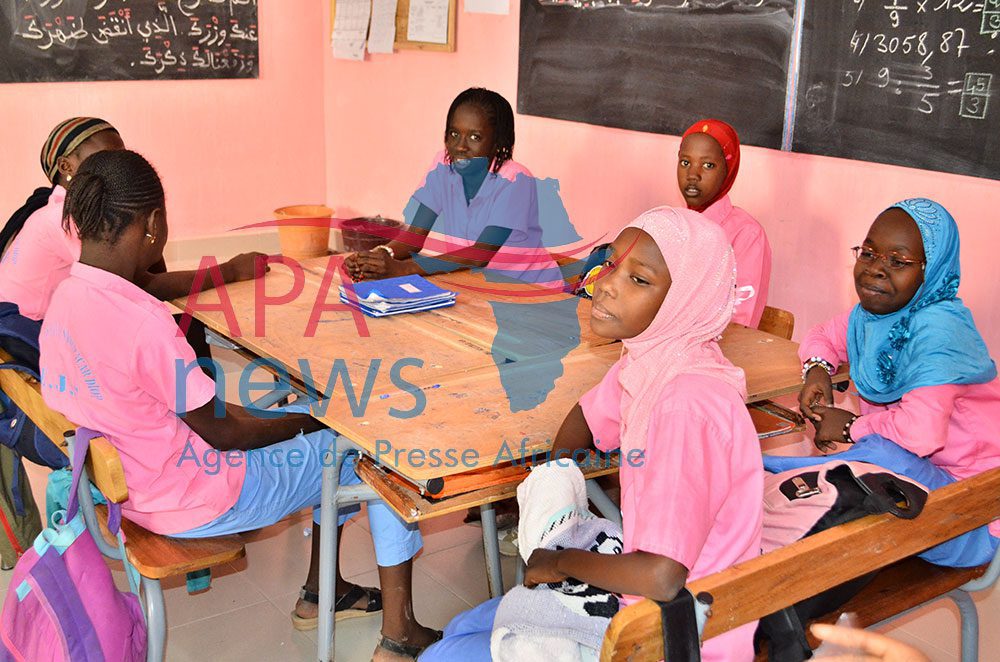Postponing the reopening of schools due to the new coronavirus has cast a shadow on the Senegal’s plan to save the 2019/20 academic year.
Late Monday night, the Ministry of National Education issued a press release announcing that the resumption of teaching would be postponed.
This decision by President Macky Sall is motivated by the detection of cases of Covid-19 among the teaching staff stationed in the southern city of Ziguinchor. Classes which were suspended since March 16 were planned to resume on June 2 for sixth grade, tenth grade and Terminale (high school) students.
The Ministry of National Education has previously organized the transport of many teachers from Dakar to the hinterland. To make this reopening of courses effective across the country, the public transport company Dakar Dem Dikk had conveyed teachers from Tuesday 26 to Friday 29 May.
Like Mr. Sall, a math teacher at a high school in Keur Samba Kane (center), over 19,000 teachers have returned to their places of service. But upon arrival in this town, Mr. Sall was full of doubts about his health.
“I have a cold and a headache. I am stressed. I have quarantined myself, even if I have to go out sometimes. I try not to be too much in touch with people. And you are screwed when people look at you as the one who brought the coronavirus into the village. It becomes too complicated for you,” he said.
The country’s capital Dakar, where this teacher came from, is the epicenter of the epidemic in Senegal. But the huge crowd at the Liberté 5 bus station, the place where teachers are to depart from, made it difficult to strictly comply with social distancing measures.
Living in Keur Massar (Dakar suburbs), Mr. Sall spent two hours on the road before reaching this bus station where physical distancing was hardly respected. He eventually managed to board the bus at the specified time after showi his pass and ID card.
Before boarding, the teacher said that he had not been tested. On the other hand, for some of his colleagues who did not have their pass or who had not received a confirmation by an SMS from the Ministry of Education, it was an ordeal.
Learning with the virus
During Mr. Sall’s trip, the bus driver, following directions, only slowed down in the central town of Bambey, his final destination. To get to the village where he teaches, he rented a car with other people and took winding and sandy paths.
In fact, the ban on movements between the country’s 14 regions, taken as part of the state of emergency, has not yet been lifted. For his part, Baye Aly Gueye did not have the same worries. Even if he teaches at a school in Pire, his hometown, Mr. Gueye wanted this restriction to be lifted to allow his colleagues “to travel in peace.”
Despite the significant resources deployed, Dakar Dem Dikk (public transport company) was unable to dispatch all the teachers on time. “I draw the attention of the authorities to the teachers who have not yet been brought back. We have to help them by increasing the number of buses. If we only take into account the transport service by district, problems will emerge. Some teachers are working in far remote areas,” Mr. Sall said.
As for Sakhir Fall, an elementary school inspector in Sedhiou (south), he says he is “psychologically prepared” for the task. But as he has been stuck in Louga (north-central) since the imposition of the third state of emergency in the history of Senegal, he must be patient.
All in all, this postponement sine die is a blow to the pupils, especially those who will sit final exams. Bineta Gueye, a student in Terminale at the Pape Djibril Diouf College in Sebikotane (outskirts of Dakar), is convinced that “an invalid school year is not the solution,” since the first semester had been completed at the time of the forced cessation of classes. According to this young girl, “losing a year of schooling is losing a year of salary.”
On the other hand, some parents do not have the same concern. For the latter, health is above all other considerations. According to their president, Abdoulaye Fane, they are inhabited by “worry and fear” because of the “pernicious nature of this virus.”
Health Protocol
With their carefree attitude, children “buy something to eat here, play with it, touch an object over there,é worries sociologist Ibrahima Diop. A father of a first grade (CM2) and another in tenth grade, he expressed reservations about the decision to resume courses.
However, the Ministry of National Education insisted on the need to apply its health protocol in order to prevent the coronavirus from entering classrooms.
The National Union of Parents of Pupils and Students of Senegal (Unapees), said its president, Mr. Fane, was involved “in the implementation of the system (which was to result) in the resumption of teaching and learning this June 2, 2020.”
And to show that it is above all the preservation of the health of all actors in education, the Minister of Education, Mamadou Talla ordered headmasters to open their doors only if all the elements of the protocol are combined: thermo-flashes, masks, soap, hydro-alcoholic gels…
“We don’t take the risk of exposing students and teachers. It’s not a union issue; it’s a public safety issue. Because we must not find a case in school that could contaminate all of Senegal,” he said in the daily newspaper, L’Observateur.
More than ever, Senegal will embark on a mad dash to complete the school year.
ODL/id/cgd/fss/abj/APA


